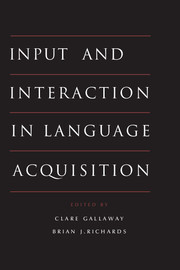Book contents
- Frontmatter
- Contents
- List of figures
- List of tables
- List of contributors
- Preface
- Introduction
- Part I General issues
- 1 The language of primary caregivers
- 2 The changing role of negative evidence in theories of language development
- 3 Crosslinguistic and crosscultural aspects of language addressed to children
- 4 Child-directed speech and influences on language acquisition: methodology and interpretation
- Part II Specific aspects of input and interaction
- Part III Types of language learner
- Conclusion
- References
- Author index
- Subject index
2 - The changing role of negative evidence in theories of language development
Published online by Cambridge University Press: 05 June 2012
- Frontmatter
- Contents
- List of figures
- List of tables
- List of contributors
- Preface
- Introduction
- Part I General issues
- 1 The language of primary caregivers
- 2 The changing role of negative evidence in theories of language development
- 3 Crosslinguistic and crosscultural aspects of language addressed to children
- 4 Child-directed speech and influences on language acquisition: methodology and interpretation
- Part II Specific aspects of input and interaction
- Part III Types of language learner
- Conclusion
- References
- Author index
- Subject index
Summary
Historical origins
The current stage in thinking about the role of negative evidence in language development is the product of many twists and turns in the history of this topic. Prior to the Chomskian revolution in linguistics and the simultaneous cognitive revolution in psychology, language acquisition was explained by behaviorist models within which feedback (or reinforcement) was the only mechanism available to effect learning (Skinner 1957; Staats 1974). The influence of these behaviorist views even on current thinking about feedback emerges in assumptions that feedback has its effect through reinforcement rather than through information value.
An alternative behaviorist view held that the primary mechanism available to child language learners was imitation (see social learning theorists such as Whitehurst and Vasta 1975; Bandura 1977), which could be shaped in the direction of adult-like forms using feedback. Thus, environmental language was assumed to have two roles: firstly, in modeling the imitations, and secondly, as a reaction to imitative attempts.
The paving of the nativist road
Chomsky's earliest theory of language acquisition (1965), which was intertwined with his theory of transformational grammar, argued that transformations were structure-dependent. In other words, the applicability of a transformation depended on the structure surrounding the to-be-transformed element(s). Chomsky also argued that these transformations were specific to language (but see Simon [1962] for a discussion of the possible generality of transformations to complex hierarchical structures).
Information
- Type
- Chapter
- Information
- Input and Interaction in Language Acquisition , pp. 38 - 55Publisher: Cambridge University PressPrint publication year: 1994
Accessibility standard: Unknown
Why this information is here
This section outlines the accessibility features of this content - including support for screen readers, full keyboard navigation and high-contrast display options. This may not be relevant for you.Accessibility Information
- 17
- Cited by
